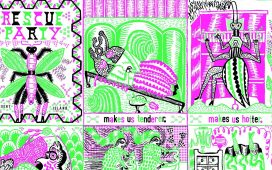This summer, Netflix announced that it would add seven Black sitcoms from the late nineties and early two-thousands to its streaming catalogue: “Moesha,” “The Game,” “Sister, Sister,” “Girlfriends,” “The Parkers,” “Half & Half,” and “One on One.” Most of these shows originally aired on UPN, a now defunct network that launched in 1995 and produced all manner of Black televisual entertainment, from beloved teen sitcoms to some less well-conceived projects. The announcement came as part of Netflix’s Strong Black Lead programming block, an initiative started in the wake of the #OscarsSoWhite debacle to amplify the work of Black creators and to address the shortage of major film and television projects made for, by, and about Black people. Netflix’s acquisition of these shows, and the company’s apparent push to brand itself as the preëminent streaming home for Black content, is a notable stage in the long, complicated history of Blackness, representation, and authorship in popular American media.
Melissa Haizlip’s documentary “Mr. Soul!”, from 2018, examines an earlier, similarly fraught period of this history. In the late sixties, the federal government sought to redress the grievances of Black communities by giving Black people a louder voice (or simply a voice at all) in public media. It was in this atmosphere that an unusual show was born. Premièring in the fall of 1968, on the New York public-television station WNDT/Channel 13, “Soul!” was one of a cadre of Black public-affairs shows that popped up in major markets around the country. Like its Channel 13 sister program “Black Journal,” the hour-long variety show was nominally meant to showcase an intrinsically Black perspective on art and politics. In practice, it proved to be something far more radical.
As the film illustrates, “Soul!,” from its inception, was uniquely daring in its mission to present a panoramic display of Black artistic sensibilities and political expression. In a pre-“Soul Train” time, the show was an unrivalled destination for Black music performance, hosting an alchemical mix of the era’s icons (Stevie Wonder, Tito Puente, Bill Withers), nascent stars (Earth, Wind & Fire; Al Green; Ashford & Simpson), and stalwarts of the Black avant-garde (Rahsaan Roland Kirk, the Last Poets, and Pharoah Sanders). It was also perhaps one of the only places on television where one could see the writer and leader of the Black Arts Movement, Amiri Baraka, perform a thunderous rendition of his poem “It’s Nation Time” over a darting Sanders improvisation, or watch contemporary Black dance, such as the delicate number choreographed by George Faison for the hour-long Stevie Wonder episode, in 1972.
Most pivotally, “Soul!” was a hub of candid, ranging, and often radical Black social and political discourse. Melissa Haizlip explained to me that the show’s producer, host, and creative architect—her uncle Ellis Haizlip—had “an expansive approach toward Black culture.” At a time when a burgeoning Black nationalist movement called upon Black Americans to coalesce under a single ideology of liberation, Haizlip said that her uncle saw to it that “Soul!” presented the true “fluidity of Black thought and Black identity.”
As “Mr. Soul!” documents, to Ellis, an openly gay Black man, this commitment could mean hosting the anti-Semitic and notoriously homophobic Nation of Islam representative Louis Farrakhan, interviewing the mother of the late Black radical George Jackson, or producing a two-hour conversation between the young poet Nikki Giovanni and her exiled idol James Baldwin. The latter segment, which was shot in London and aired as a two-part special, is one of the more astonishing artifacts in the show’s archive. Quite unlike the sensationalized and overproduced appointment-viewing events of the modern era, the Giovanni-Baldwin conversation is quiet, humming with the kind of casual intensity that only people who have dedicated long, solitary thought to the ideas they’re expressing tend to convey. Two of the most important artist-intellectuals of the twentieth century were engaged in intimate communion on national television.
Magic moments like these, and the show’s pioneering vision, were, in large part, a by-product of its ambitious host. Through extensive archival footage, recitations from Ellis’s personal journals, and testimonials from an exhaustive who’s who of friends, collaborators, and admirers, “Mr. Soul!” paints a picture of a figure every bit as well versed, well connected, and well respected as any of the era’s important entertainment figures, but whose legacy and immense contributions have largely been left out of the annals of popular memory. Ellis was a beacon of the New York art and entertainment world, known for his convivial air, penchant for playful fibbing, and teeming black book. He was a stage manager for plays that helped give James Earl Jones and Cicely Tyson exposure early in their careers. He enlisted the help of the famed Beatles manager Brian Epstein to bring a dance show choreographed by Donald McKayle called “Black New World” on a tour across Europe. And even after his tenure at “Soul!” ended, he continued to be a patron of Black arts in New York and beyond: he served as a friend and mentor to future legends such as Luther Vandross and Michael Jackson (Ellis produced Jackon’s twenty-first birthday celebration at Studio 54) and was the director of special programs at Harlem’s Schomburg Center for Research in Black Culture until his death, in 1991.








